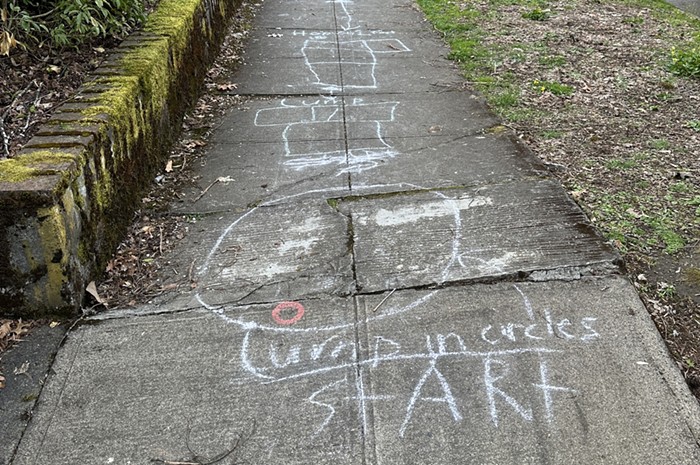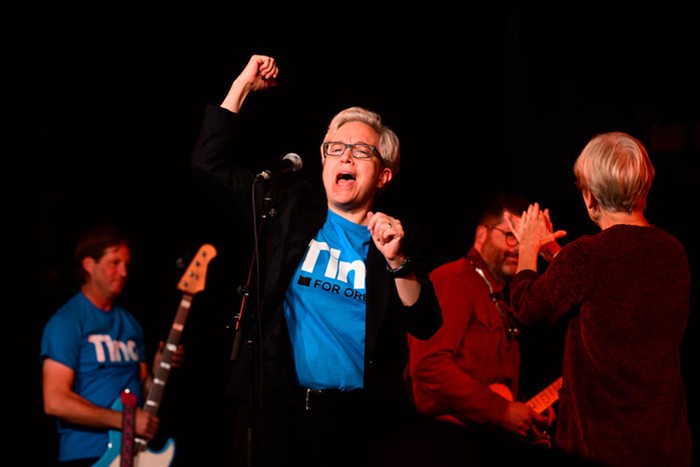
If Portland officials approve a bold new system for financing city elections in coming weeks, it's not going to be housed anywhere near city elections staff.
Instead, the Mercury has learned Commissioner Amanda Fritz is now planning for her proposed publicly financed election system—known as "Open and Accountable Elections"— to have a home in a small bureau she herself controls: the Office of Neighborhood Involvement (ONI).
"It's not ideal, but it works," Tim Crail, Fritz's chief of staff, said Thursday. "It's the home we can make happen."
ONI isn't exactly the place you'd expect to see a program that monitors campaign finance, and distributes thousands and thousands of tax dollars to political candidates. Historically, the tiny bureau has worked with the city's neighborhood associations, dolling out cash and offering support in a bid to increase citizen participation.
But lately, ONI's taken on more and more responsibility. It now implements rules on liquor and marijuana businesses, enforces the city's noise ordinance, and does a lot of other stuff, too. In the last four years, the bureau's budget has grown roughly 44 percent, from $7.1 million in Fiscal Year 2014, to $10.2 million in the current budget.
And as things stand, it appears it'll soon have another big job tacked on.
As the Mercury first reported, Fritz initially hoped to house her proposal in the Portland Auditor's Office, which administers city elections. The problem: Auditor Mary Hull Caballero wasn't having it. She argued her office was already overtaxed, and said Fritz would be violating the city's charter by attempting to force the elections program onto her.
Fritz's office inquired whether the Multnomah County Elections Division might be willing to take the program on, but was essentially rebuffed.
So now it looks as though it's headed to ONI—which could get two more staffers to implement Open and Accountable Elections. The bureau isn't a complete mismatch for the elections system. It's focused on increasing civic participation, and Fritz argues public financing will help upstart candidates run a serious campaign.
It doesn't appear Portlanders will have a formal say into whether the new elections system moves forward.
In 2010, voters narrowly decided to do away with the last campaign financing system Portland thought up, known as voter-owned elections. Some have suggested, then, that voters should decide whether another system takes its place.
But City Hall sources say that probably won't happen. They suggest Fritz has at least two votes to support her idea without referring it to voters: Mayor Charlie Hales and Commissioner Steve Novick, who are both leaving office at the end of the month.
Fritz has been candid about the fact she's looking to get her elections plan passed before the year's up, since Hales is supportive, and it's not clear Mayor-elect Ted Wheeler is enthused about the idea. A hearing on the proposal is scheduled for December 7. Here's a draft [PDF] that was circulating roughly a month ago.
And here's a brief rundown of the program, stolen from a post I wrote in October:
Candidates interested in participating in the program would agree to accept donations of no more than $250 per person, and to limiting their spending (a maximum of $950,000 for mayoral races, and $550,000 for city commissioner and auditor races). To qualify candidates would have to prove their candidacy is viable by collecting a set amount of donations from a set amount of voters—at least $5,000 from 500 voters for mayoral candidates, at least $2,500 from 250 voters for commissioner or auditor hopefuls.
Once they did that, the city would commit to paying $6 for every $1 candidates raise from individual donors, up to $50. That means a small $50 donation could be leveraged into $350. There's a limit on the amount of public funds candidates can draw, though. The policy maxes out at $760,000 in public funds for mayoral candidates (between primary and general elections), and $360,000 for city commission candidates.
Fritz pitches the program as a way to ensure candidates talk to large numbers of voters and not just a few moneyed interests. Oregon has no campaign finance limits.
The program's location in City Hall isn't the only thing that's bounced around. Crail says there are now plans to push back full implementation of the system until after the November 2018 election because of concerns it wouldn't be ready in time to handle candidates before then.
In the mean time, he says, the city would get to work appointing a seven-member Public Campaign Finance Commission that helps oversee the system, and Fritz would be lobbying for the program to get full funding—currently maxed out at roughly $1.2 million—in next year's budget.


















